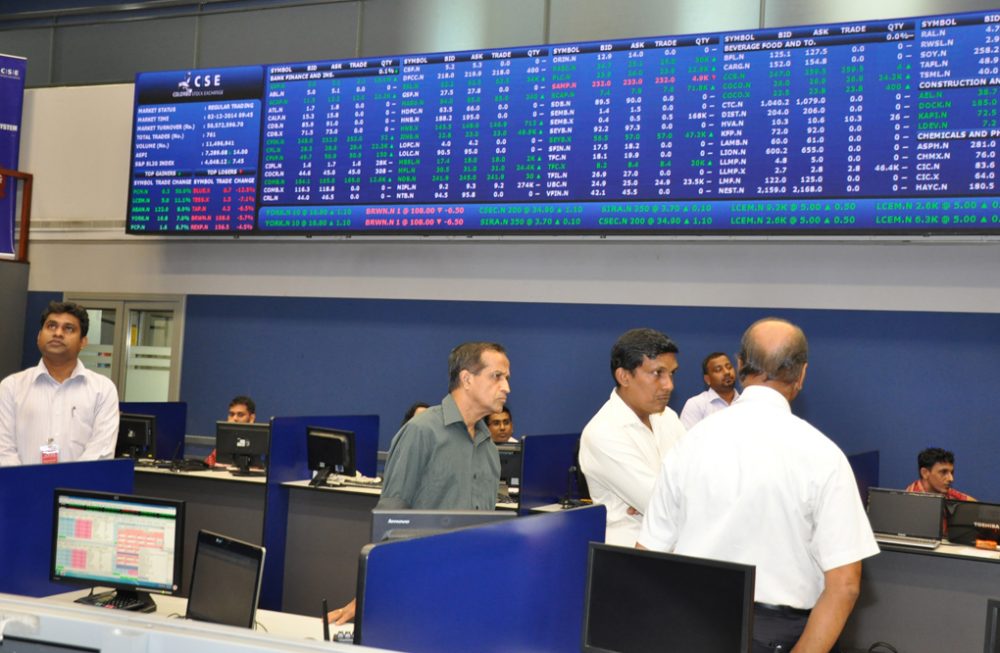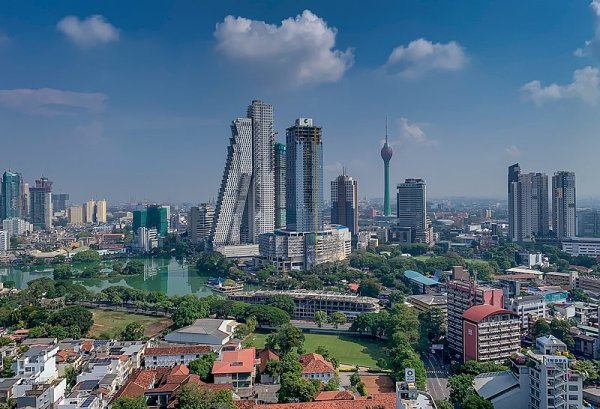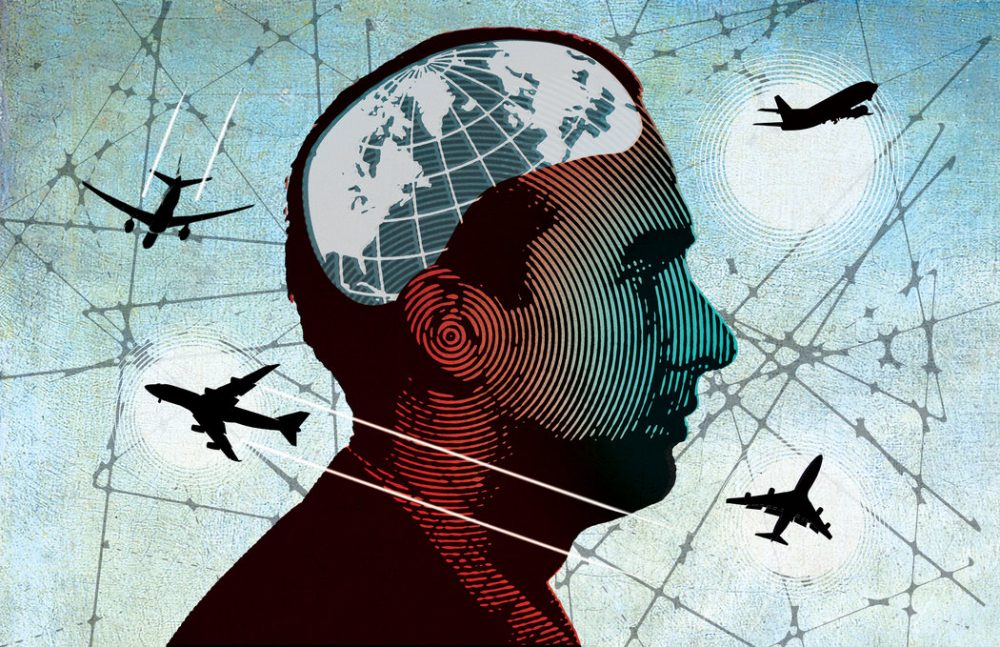
People leaving their lands of birth in search of adventure, and better economic prospects is nothing new. It is the basic phenomenon behind the birth of many of today’s most advanced economies, the United States being, perhaps, the foremost example of this. The ability to go where one’s skills are rewarded the most is also a basic human right, and to bar an individual from seeking greener pastures would be a violation of his or her economic freedom.
In the modern world, migration is a hot topic. For one, it makes certain countries better off, and others worse off. Entire elections are decided on migration, just look at the meteoric rise of Donald Trump and Brexit (even though that is technically not an election, but a referendum).
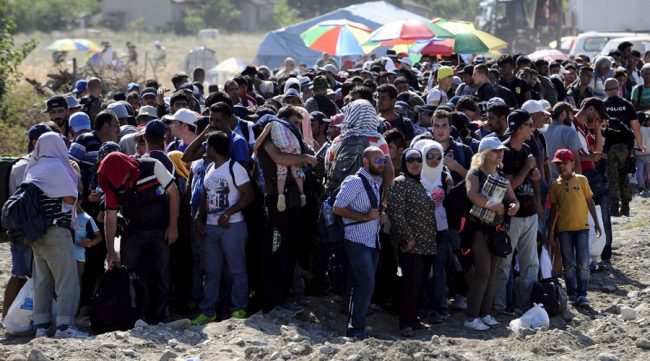
Migrants queue at a registration and transit point in Macedonia. Image courtesy: RT.com
As a lower middle-income country, Sri Lanka too is very much affected by, and benefits from, migration. On the one hand, migration allows Sri Lankans to improve the lives of their dependents back home. The remittances into the country from Sri Lankans employed abroad are obviously good for the country. Lower-skilled workers who find employment abroad are able to lift their families out of absolute poverty, which wouldn’t be possible otherwise.
That brings us to another question: what about workers with higher, advanced skills? How does migration affect them, the country, and society at large?

Passengers pack the waiting hall at Honquiao Railway Station, which services a terminal at Shanghai Honquiao International Airport. Image credit: NPR
First, let’s establish the obvious, and get that out of the way. Take any person with advanced skills like doctors, biologists, engineers, lawyers, accountants, wealth managers etc. For workers who belong to this category, work is always going to be plentiful in fast-growing and developed countries. These workers will be in demand, which means wages will also be higher. All else remaining equal, migration from a poorer country to a richer country is going to benefit highly skilled workers.
Next, there is the effect of migration on the country. At any given moment in time, the pool of skilled workers in any country is going to be limited. After all, it’s not like we have a machine which can churn out people according to any given specification. When individual members of this pool of highly skilled workers start to leave in search of greener pastures, the countries which receive them with open hands will see their ranks of highly skilled works swell.
More labour means more resources. More resources means more productive capacity, which in turn means more economic growth. And since labour is a limited resource, when people migrate from one country to another, one country benefits, and another loses out. When a country benefits, it is referred to as a “Brain Gain”, and when a country is on the losing side, it will fall into the “Brain Drain” camp. And Sri Lanka firmly falls into the latter.

People arrive at Ellis Island in N.Y, which was the busiest inspection and registration station for immigrants to the Unites States in the early 1900s. Image courtesy: Schmoop.com
So What Is Brain Drain, Really?
Brain Drain actually refers to a phenomenon called “Human Capital Flight”, which refers to the emigration of talented and educated individuals in significant numbers, often in search of better professional opportunities, and a higher standard of living.
What Drives Brain Drain?
At a national level, Brain Drain occurs when people decide that their home country doesn’t reward their skill adequately, in terms of pay, career development, or both. It can also occur because of political turmoil, famine, poor quality of life, and other similar factors.
Does Brain Drain Affect Sri Lanka?
Yes, it does. Quite a lot, actually. Just look at the numbers below.
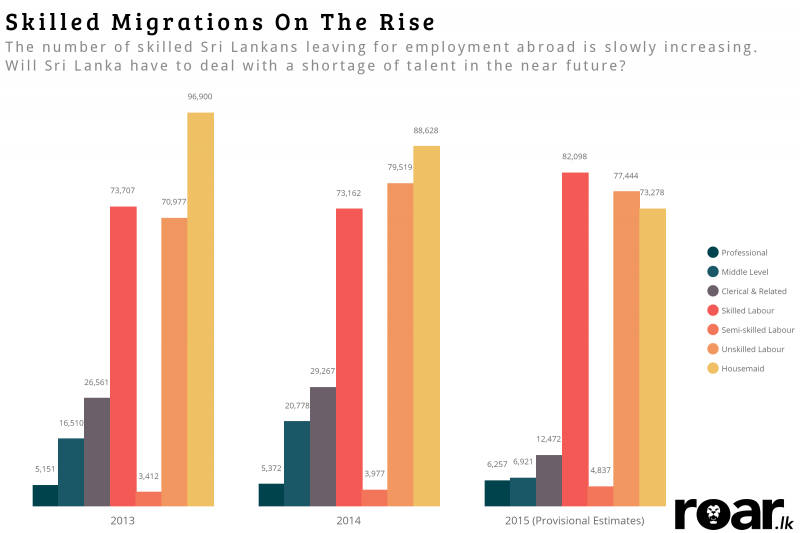
Data courtesy Central Bank of Sri Lanka
A considerable number of Sri Lankans with valuable skills are going abroad in search of employment. Not in droves, obviously, but in numbers adequate enough to raise eyebrows in a country with a workforce of around 8.5 million.
How Will It Affect The Country?
Over the long term, continuous brain drain will deprive a country of valuable talent, talent which would by then be desperately needed in all sectors of the economy, starting with crucial ones like business, education, health, construction, power and energy, and transport.
A smaller workforce would also negatively affect economic growth, because now, fewer people will be available to convert raw inputs into finished goods. Lower economic growth will mean that Sri Lanka will find it hard to transition into a high income country, spelling bad news for all of us.
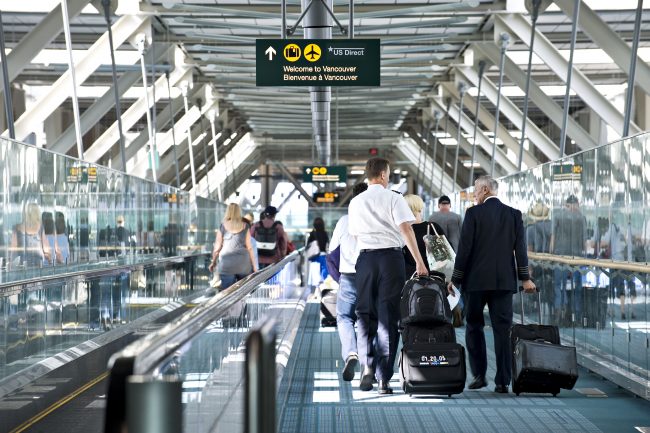
Passengers arrive at the Vancouver International Airport, Vancouver, Canada. Image courtesy: familyworksbc.com
What Can Be Done To Reverse Brain Drain?
One thing is for sure, you cannot ban people from seeking employment abroad. Such a ban would be a violation of human rights, economic freedom, and is downright illegal. Moreover, it would also be bad for the economy, which will be deprived of valuable foreign exchange. Needless to mention, such a policy would also be, in simple words, a major disaster, and could be a cause for social unrest.
Instead, what should be done is to speed up the structural changes necessary to help Sri Lanka become an advanced economy. Such reforms would include increased trade liberalisation, consistent policy-making, well-targeted incentives for businesses to set up in Sri Lanka, free trade pacts with key export markets, stronger institutions, and better rule of law. Such measures would stimulate the creation of jobs in the economy, and with the passage of time, the country would be able to reverse its brain drain. Reversing brain drain is not something which can be accomplished overnight.
If Sri Lanka is to successfully position itself as an innovative, growing, and prosperous economy, it must force its policymakers to put an end to their petty quarrels. Instead, the powers that be must look to drive sustainable economic growth, which is the most surefire way to bring prosperity and reverse brain drain. Until that happens, Sri Lanka’s brain drain will never reverse itself, and the country will forever remain stagnant.
Featured image courtesy: nytimes.com/Andy Martin



